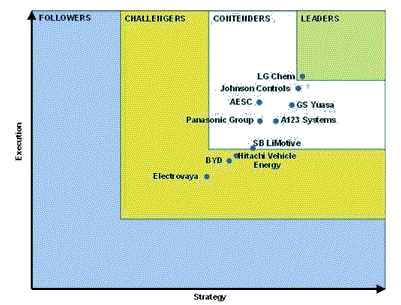Lithium-Ion Battery Market to Grow 700% by 2017, New Report Finds
 Pike Research has just come out with a new market research report, “Electric Vehicle Batteries.” The report, which ranks what it thinks are the top 10 Lithium-ion battery companies, finds that market revenue for Lithium-ion (Li-ion) batteries for transportation (EVs and plug-in hybrid electric vehicles) “will grow over 700%, from $2.0 billion annually in 2011 to greater than $14.6 billion by 2017.” The installed cost of Li-ion batteries is projected to drop by one third in that time.
Pike Research has just come out with a new market research report, “Electric Vehicle Batteries.” The report, which ranks what it thinks are the top 10 Lithium-ion battery companies, finds that market revenue for Lithium-ion (Li-ion) batteries for transportation (EVs and plug-in hybrid electric vehicles) “will grow over 700%, from $2.0 billion annually in 2011 to greater than $14.6 billion by 2017.” The installed cost of Li-ion batteries is projected to drop by one third in that time.“The market for Li-ion batteries will be driven primarily by plug-in hybrid electric vehicles (PHEVs) and battery electric vehicles (BEVs), which require much larger battery packs than hybrids,” says research director John Gartner. “Battery chemistries that prioritize energy capacity over power density can satisfy both the PHEV and EV battery segments, enabling vendors to offer products to multiple vendors for multiple models. Reducing the installed price of EV batteries to $523 per kilowatt hour in 2017 will be a critical step towards making PEVs cost-competitive with petroleum-powered vehicles.”
One key factor bringing down the price of these batteries will be significant growth in their production and use, and the scaling benefits of that.
Pike Resarch’s 36-page report also focuses on government’s important role in getting the cost of Li-ion batteries down and expanding the EV and PHEV markets.
Here’s a little more, from the report abstract, including what Pike Research sees as the top 10 Li-ion companies:
The Li-ion automotive market is currently led by Japanese and Korean companies that originally produced cells for the consumer electronics and computing markets. These veteran companies are being challenged by companies mostly from China and North America that are slowly gaining customers, mostly in their domestic markets. The Li-ion automotive market is entering a mature phase that will see some smaller companies fail or be acquired due to an inability to reach volume production. The market will likely see volatility during 2012 as some supplier agreements change hands.
This Pike Research report evaluates 10 of the leading electric vehicle battery manufacturers and rates them on 10 criteria for strategy and execution, including vision, go-to-market strategy, partners, product strategy and roadmap, geographic reach, market share, sales and marketing, product quality and reliability, product portfolio, and staying power. Using Pike Research’s proprietary Pike Pulse methodology, vendors are profiled, rated, and ranked with the goal of providing industry participants with an objective assessment of these companies’ relative strengths and weaknesses in the emerging electric vehicle battery marketplace.
Top 10 Vendors:
1. LG Chem
2. Johnson Controls
3. GS Yuasa
4. AESC
5. A123 Systems
6. Panasonic Group
7. SB LiMotive
8. Hitachi Vehicle Energy
9. BYD
10. Electrovaya
You can return to the main Market News page, or press the Back button on your browser.

